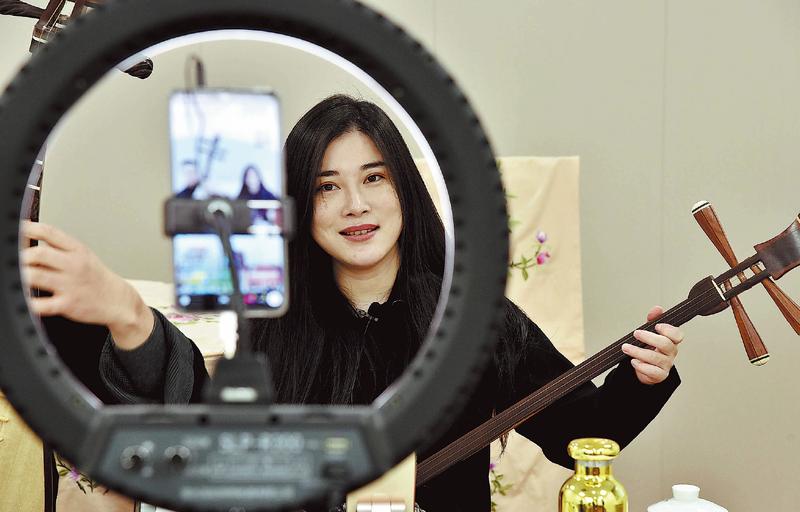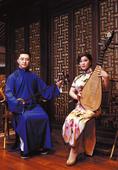Performers are livestreaming shows to find new audiences amid the COVID-19 outbreak, Chen Nan reports.
 Lu Jinhua makes her first livestreaming show, as an effort to reach out to younger audiences. (PHOTO PROVIDED TO CHINA DAILY)
Lu Jinhua makes her first livestreaming show, as an effort to reach out to younger audiences. (PHOTO PROVIDED TO CHINA DAILY)
The day before he performed on March 8, Gao Bowen was nervous, which was unusual for the veteran pingtan artist.
The 50-year-old is the director of Shanghai Pingtan Troupe and has performed the ancient Chinese art form of singing and storytelling since he was 17.
Instead of performing in front of a small crowd in teahouses or smaller theater venues, this time Gao gave his debut livestreaming show on Douyin, a popular short-video app known as TikTok outside China.
"This is the first livestreamed show of Shanghai Pingtan Troupe. If you have watched pingtan performances before, please type number one. If not, type number two," Gao said in front of a microphone and a camera during the show, sitting alongside another pingtan artist, Lu Jinhua.
While reading messages sent by people watching the live show, Gao introduced pingtan pieces, responded to audience questions and interacted with Lu.
"It was more challenging than I had thought. Usually we sit onstage, perform the pieces we've known very well and audiences respond with their applause. But while livestreaming this show, I didn't know where to look at and I had to adjust the tempo of my performance at different times," says Gao.
The COVID-19 pandemic had led to the shutting of public places such as theaters and teahouses, where Gao and other artists of the Shanghai troupe used to regularly perform.
The troupe, which was founded in 1951 as the first national pingtan troupe, has canceled or postponed all its performances in the past three months.
More shows that were to be held in Italy and the United States in June have also been canceled, given the global situation as a result of the coronavirus.
"We tried to find possible ways to perform for the audience. So we decided to give online performances, which is a totally new territory for the art form," Gao says.
Pingtan originated in Suzhou, East China's Jiangsu province, during the Song Dynasty (960-1279). It usually involves just two performers: one male and one female, who play the traditional musical instruments, sanxian and pipa, while singing ballads and telling stories in the Suzhou dialect at teahouses or small theaters.
Besides old classics, new pingtan works include modern takes on old stories and adaptations based on social events or topics.
Unlike Peking Opera, another major art form with a 200-year history that has high-pitched singing and martial arts, pingtan performers usually sing in soft voices.
Pingtan has a following in the southern areas of the Yangtze River, including Shanghai, Suzhou, Hangzhou and Nanjing.
"If you ride a boat along the waterways of Suzhou, you will hear the sound of pingtan from teahouses on the riverbanks. There are hundreds of venues in the city where pingtan shows are staged daily," Gao says.
The art form has added to the lifestyle of the elderly who enjoy it while sipping tea and eating snacks, he says. "The atmosphere is very relaxed and slow."
Real-time challenges
"When we hold the virtual shows, the tempo is faster. We have to talk more to the audience than perform, unlike in real shows. The language has to be easy to understand and fun, too. For example, the first online show was on March 8, International Women's Day, and we chose a theme about classic female characters in pingtan," Gao says.
Lu, 35, the other pingtan artist, premiered her new piece titled Hair, which she dedicated to female medical workers who fought on the front lines against COVID-19 in Hubei province, China's worst-hit area.
"They got their hair cut to make it more convenient to work at the hospitals. This touched me. I also have very long hair and I know it's difficult to part with," Lu says. "I wanted to pay my respect to them."
 Gao Bowen (left) and Lu Jinhua used to perform in theaters and teahouses before the COVID-19 pandemic. (PHOTO PROVIDED TO CHINA DAILY)
Gao Bowen (left) and Lu Jinhua used to perform in theaters and teahouses before the COVID-19 pandemic. (PHOTO PROVIDED TO CHINA DAILY)
The first livestreamed performance was received well, especially by the younger audience. Some told Gao that they had never watched pingtan shows before and they found the art form interesting and wanted to watch shows in theaters after venues reopen. Some others shared the online performance with their parents or grandparents, who are loyal fans of pingtan.
Within a week of the first livestreamed show, the number of online fans of the Shanghai troupe had increased by about 1,000. Now, the troupe has nearly 4,000 followers on Douyin.
On March 15, the troupe livestreamed its second show and on March 30, a third online show was staged with a theme of characters from the 18th-century novel, Dream of the Red Chamber, written by Cao Xueqin.
Born and raised in Shanghai, Gao grew fond of the art form by listening to pingtan programs on radio. He attended Shanghai Traditional Opera School to learn pingtan as a teenager.
Over the years, he has been trying different ways to popularize the art form. He mixes pingtan with different music genres such as rock, world music and classical music.
He performed pingtan in Lust, Caution, a 2007 thriller set in 1942 Shanghai and directed by Ang Lee. Gao's "subtle singing and frequent changing rhythms reflected the characters' emotions and anxiety on screen very well", according to a critic of the movie.
"I had never watched livestreamed shows before I actually started to prepare for my first such show. I thought it belonged to young people. I now find it exciting and challenging. It has also inspired me to do more online shows to help young people learn about pingtan," he says.
The Shanghai troupe has been sharing videos of rehearsals and practice sessions of elderly artists since February to promote pingtan.
New approach
With streaming apps becoming increasingly popular entertainment options during the outbreak, other traditional art forms have also found new audiences.
For example, shows by Shan Tianfang, a late pingshu (storytelling) master, are among the most listened-to artists on Himalaya FM, a podcast app.
Besides Shanghai Pingtan Troupe, more artists of traditional art forms are adapting to the new circumstances by livestreaming shows. Artists of Peking Opera, Yueju Opera and Kunqu Opera were giving online shows on Douyin from March 26 to 30.
Performers from Beijing-based Hip-hop Cross-talk Club have been streaming two-hour performances at 8 pm local time since Feb 17.
Led by the club's founder, Gao Xiaopan, the shows feature crosstalk of different forms such as dankou (monologue), duikou (performed by two) and qunkou (performed by three or more people), as well as other traditional folk arts such as pingshu and kuaiban (a traditional talk show recited to the rhythm of bamboo clappers).
Kunqu Opera artist Zhang Jun livestreamed a show on March 1 on seven major streaming sites that attracted over 1 million viewers. Since Feb 14, he has been livestreaming shows every night, displaying his diverse skills.
With a history of about 600 years, Kunqu Opera was listed as an intangible heritage of humanity by UNESCO in 2001.
Zhang, who learned to perform at age 12, founded the Zhang Jun Kunqu Opera Center in Shanghai in 2009 to keep pushing the boundaries of the art form.
"It's a new way to keep the ancient art form alive through online programs. I sing, dance, do physical training, explain Kunqu Opera and chat in real time with the audience, who may have never watched Kunqu Opera before and could become fans," Zhang tells Shanghai-based Xinmin Evening News.
Contact the writer at chennan@chinadaily.com.cn


